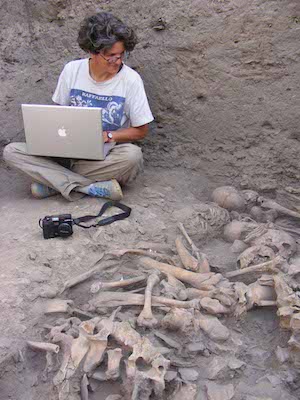
Tell Brak
Tell Brak, in the Upper Khabur region of northeast Syria, is one of northern Mesopotamia's largest ancient sites and among the world's earliest cities. It was first photographed from the air by Fr Pierre Poidebard in the 1920s and was first excavated by Sir Max Mallowan in 1937-8. Excavations were resumed by David and Joan Oates in 1976. Since 2006, Augusta McMahon has been the Field Director.
Current research themes of the Brak project comprise issues in ancient urban sustainability, including:1) The nature of early urbanism, industry and socio-economic complexity. Excavations and surveys at Brak since the early 1990s have been instrumental in challenging the traditional orthodoxy that the world's earliest urban centres were located only in South Iraq. Ongoing excavations near the north entrance to the settlement have revealed a late 5th–early 4th millennium BC industrial area adjacent to a monumental secular structure. A wide range of common-place and elite goods was produced here (tools, textiles and obsidian vessels and inlays), while clay container sealings provide evidence for a multi-level system of economic control. Excavations in 2011 in the Outer Town revealed additional industrial installations, including a possible textile dyeing or leather processing area.
2) Early warfare and violent conflict. Excavations in 2007-08 explored a series of mass graves on the outer edge of the city, dating to c 3800-3600 BC. Stratigraphic and forensic analyses suggest violent conflict as the cause of death for several hundred young adults, occurring at the same time as expansion of settlement to urban scale at Brak. This violent conflict derived from internal resistance and social stresses within the dynamics of urbanisation.
3) The exploration of human adaptations to climate change. The later 3rd through mid 2nd millennia BC (Post-Akkadian through Mitanni) saw increased aridity across the Middle East, and a much-debated rapid worsening of the climate has been proposed for the terminal 3rd millennium. Brak saw continued occupation across these climatic changes, but the contents of contemporary private houses (excavated 2007-2009, 2011) reflect adaptations to the exigencies of climate change.
From 2011, archaeological research at Tell Brak was funded by a British Academy Research Development Award (BARDA); the project focuses on the physical creation of the city, its boundaries and economic sustaining areas, and the dynamics of urban resource acquisition in the late 5th-early 4th millennium BC. This project is currently suspended due to political difficulties in Syria.
The external project's website gives further details on the site's history, past and current research, and publications.
The project also has a Facebook group.





